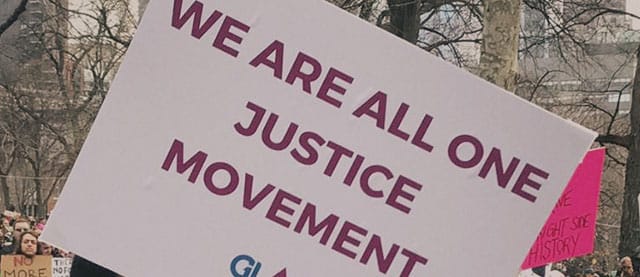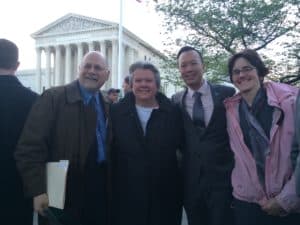
Blog
This is not simply the first 100 days of the Trump Administration. This has also been the first 100 days of a powerful and united resistance that has taken to the streets, the courts, and the ballot box, to voice our dissent loud and clear.
On the eve of Trump’s disastrous 100th day in office, Facebook reminded me of a memory that feels like a lifetime ago, even though it’s been only two years. It was a photograph from April 28, 2015 on the steps of the U. S. Supreme Court, as I waited in line to hear GLAD attorney Mary Bonauto argue for the freedom to marry for couples across our country. It was less than six months into my tenure as Executive Director of GLAD, and my face beamed with hope for what we could continue to achieve for the LGBTQ community going forward, if we only dream big. Fast forward two years, and at the end of Trump’s first 100 days, our community is facing unprecedented attacks.
This administration and its accomplices in Congress have
Fast forward two years, and at the end of Trump’s first 100 days, our community is facing unprecedented attacks.
This administration and its accomplices in Congress have
- rolled back transgender students’ rights
- accelerated the defunding of Planned Parenthood
- attempted a Muslim travel ban and targeted Muslim-Americans here at home, and
- demonized, threatened, and deported immigrants, tearing families apart.
- A key advisor to Trump recently reassured opponents of equality that the administration remains committed to rolling back LGBTQ rights, by issuing an executive order that would not only sanction but invite public and private discrimination against LGBTQ people based upon individual religious beliefs.
- This week brings renewed attempts to repeal the Affordable Care Act, which has provided health care to countless in our communities, particularly transgender individuals and people living with HIV.
- And the Department of Health and Human Services is threatening to erase LGBT older adults from the National Survey of Older Americans Act Participants, which provides critical data on whether federally-funded aging programs like meals on wheels, family caregiver support, adult daycare, and senior centers are reaching all older adults, including LGBT older adults.
It is a resistance that has embraced the intersections and the commonality in our social justice struggles, as well as the power in our diversity. And those connections begin one-on-one. Just yesterday, the Executive Director John Robbins of the Boston chapter of the Council on American-Islamic Relations Massachusetts (CAIR) and I met to strategize around building a stronger relationship between our two organizations. We came together, because we both understood that we are one justice movement. That is how we will fight, and that is how we will win. Two years ago, I was at the U.S. Supreme Court to hear not only LGBTQ civil rights champion Mary Bonauto argue for our community, but also Solicitor General Donald Verrilli. To have the weight of the executive branch, under President Obama’s leadership, behind our fight for equal protection under the Constitution is a milestone that cannot be overstated. In his argument, Solicitor General Verrilli described how the 2003 victory in the Lawrence kiện Texas Supreme Court case, striking down state anti-sodomy laws, was the catalyst for the nascent marriage equality movement.That is how we will fight, and that is how we will win.
When I am feeling hopeless, as I sometimes do, I draw strength thinking of the generations of lawyers and activists who were our movement’s catalysts, despite hostile forces all around them. Their resistance in the 70s, 80s, and 90s sparked a revolution that made it possible for me to stand two years ago – along with so many in our community – at the precipice of history making outside the U.S. Supreme Court. And even as dark as the last 100 days have been, I derive hope from the millions of concerned people across the country who are awake and engaged for social justice. Together, we will be a firewall against the attacks aimed at any one of us, while advancing justice for all of us. Together, we will be the catalysts for the generation of powerful activists and advocates to come.Together, we will be a firewall against the attacks aimed at any one of us, while advancing justice for all of us.




 Judge Gorsuch’s writings and judicial record cause us to doubt that he shares a fundamental view of the Constitution: namely that it enshrines certain basic rights for all Americans, including:
Judge Gorsuch’s writings and judicial record cause us to doubt that he shares a fundamental view of the Constitution: namely that it enshrines certain basic rights for all Americans, including:





